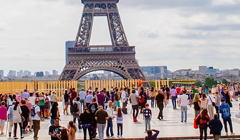أوروبا
23 الفيديو
مدة الدورة: 1 ساعة و 15 دقائق
EU looks to revive tourism industry after disappointing summer season
00:02:50
سعر الفيديو: 5 ریال اسبوعي
As the summer season draws to a close in Europe, airlines and tour operators are counting their losses. While some destinations are pinning their hopes on the winter season, others will have to find ways of mitigating the damage. The European Commission has said that “revenue losses during the first half of 2020 for hotels, restaurants, tour operators, long distance train operators and airlines were roughly 85-90%." Europe is the world's leading tourist destination , the industry is a vital part of the EU’s economy and contributes towards 10 percent of its GDP, which is why the EU is looking to help both small and big companies hit by coronavirus travel restrictions. Some 2.4 million businesses in the EU are tourism enterprises, with 90 percent of them being small and medium-sized businesses. Out of the 23 million tourism jobs in the bloc, six million of these are estimated to have been lost as a result of the pandemic. What is the EU doing to help the continent's flailing industry? The EU announced a package of measures in May to revive tourist-linked business. This included a coordinated approach to travel restrictions across the EU to ensure health and safety of passengers, as well as recommendations on compensation to travellers for cancelled holidays. However, the desperate need for financial relief is what MEPs want to see fulfilled. Cláudia Monteiro de Aguiar, a Portuguese MEP, told Euronews that the European Commission must send money to Member States "as quickly as possible", in order to fill the needs of the tourism sector, which has been hit "particularly hard". She added that it will be "hard" for the industry to reach pre-pandemic levels over the next two years. The European holiday season this year hasn’t been an easy one for holidaymakers either. Countries that have seen a high level of coronavirus cases over the summer have had travel restrictions imposed on them by individual member states. EU countries such as Hungary recently closed their borders to foreign nationals, and countries are turning from orange to red zones with 48 hours notice. Last week, the European Commission updated their proposals for a coordinated response to these restrictions within the EU, which was praised by the European Tourism Association's CEO, Tom Jenkins: "I think the proposal to have some form of coordination when it comes to quarantine measures is really to be welcomed because at the moment it is piecemeal and done on a national basis and there is no consistency, nor any conformity to any kind of pattern throughout Europe and it really is chaos at the moment." However, Irish Green MEP, Ciaran Cuffe, has described the pandemic as a way to reshape tourism into a greener, more sustainable model: “There is a role for the European Parliament and the European Union in terms of climate action to say look, let’s not give too many incentives for short-stay tourism and let’s focus on a greener model of people spending more time in a region, perhaps travelling by train, if they can, particularly on shorter distances avoiding those short-haul flights and putting a little bit more time and effort into an offering that can deliver jobs at a local level and a lower carbon footprint.” The tourism industry will certainly emerge from the pandemic differently and looks set to face a tough few years.




